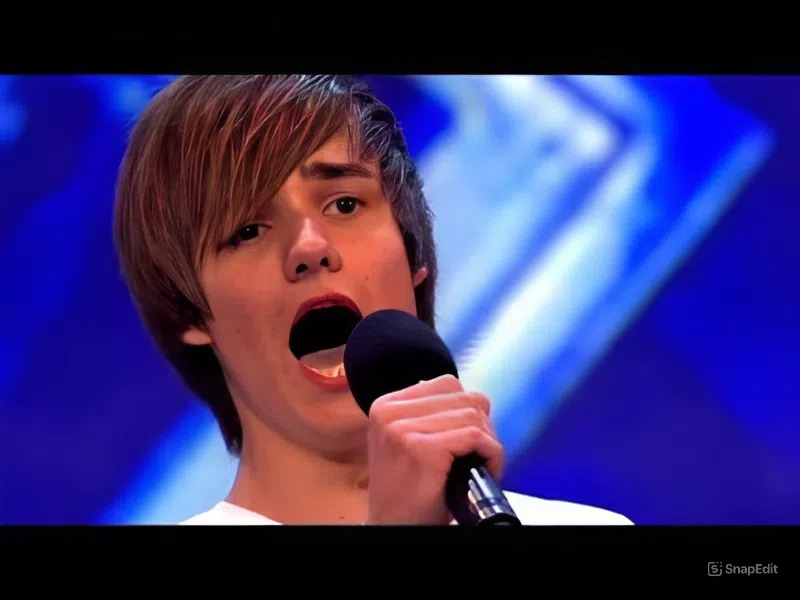At 14, Liam Payne stood under the blazing stage lights of The X Factor UK, his hands slightly trembling, his heart pounding hard against his chest. Behind his polite smile and neatly styled hair was a boy from Wolverhampton with a dream bigger than anything he’d ever known.
He wasn’t flashy. He didn’t have a wild persona or a sob story rehearsed for the cameras. What Liam had was raw talent, a supportive family, and a quiet fire that most overlooked. He walked out, greeted the judges with nervous charm, and sang Frank Sinatra’s “Fly Me to the Moon.” His voice was smooth, confident for his age, and carried a touch of that old-school flair few teens could pull off.
Simon Cowell leaned back in his chair, eyebrow slightly raised. He saw something there—potential, but something unripe. “You’re good,” Simon told him. “You’ve got something. But I don’t think you’re ready. Come back in a couple of years, and let’s see where you are.”
It wasn’t rejection. Not exactly. But to a 14-year-old, it felt like the world had slammed shut in front of him.
Liam left the stage that day holding back tears, but his disappointment turned quickly to determination. “I’ll be back,” he whispered to himself in the wings, fists clenched. And he meant it.
Two Years Later: A New Liam Returns
Liam returned to The X Factor stage in 2010. Older now. Taller. Stronger. And more importantly—ready.
This time, he chose Michael Bublé’s “Cry Me a River.” A bold move. The song demanded vocal control, emotional depth, and swagger. Liam had all three now, sharpened by two years of focused training, open mic nights, and endless hours in front of the mirror rehearsing not just notes, but nuance.
When he walked out, the crowd was curious but quiet. Not many remembered his first try. But when the first haunting line left his mouth, the silence was replaced by something electric. The tone of his voice cut through the auditorium like smoke—smooth, but filled with grit. He wasn’t just singing. He was commanding the stage.
The judges leaned in. Even Simon’s eyes lit up.
By the time he finished, the crowd was on its feet. A standing ovation. Liam exhaled, overwhelmed, humbled, and finally… seen.
Simon smiled. “Now that,” he said, “was worth the wait. You have the X factor, Liam.”
But Liam’s journey was far from over.
A Twist of Fate: One Direction Is Born
Despite the strength of his solo audition, Liam didn’t make it to the final stages of the competition as a solo act. But fate had something else planned.
Backstage, producers began putting together a group of boys who, individually, hadn’t made it through. Liam was one of them. Alongside Harry Styles, Zayn Malik, Niall Horan, and Louis Tomlinson, a new chapter began. They would be called One Direction—a name Harry casually suggested, not knowing it would soon be shouted by millions across the globe.
Their chemistry was instant. Not just as performers, but as friends. Liam brought structure and vocal control to the group. He was, in many ways, the backbone—responsible, focused, and quietly ambitious.
As the weeks passed, their fanbase exploded. Though they didn’t win The X Factor, One Direction became a global sensation. Sold-out arenas. Chart-topping albums. Screaming fans in every corner of the world. From Tokyo to Toronto, their faces were everywhere.
Liam, the boy who had once been told to “come back later,” was now a pop superstar. And he never forgot that first audition, that moment of redirection rather than rejection.
The Heart Behind the Fame
Liam’s fame grew, but he remained grounded. He spoke often of his humble beginnings, his parents, and the heartbreak of his first audition. It became a story he owned—proof that failure wasn’t final, only formative.
He also became an advocate for mental health and self-improvement, often opening up about the pressures of stardom and how he worked through personal struggles. Liam used his platform not just to sing, but to speak—to connect with the very people who had once been like him: young, insecure, and full of dreams.
His solo career later blossomed, with songs that showcased not just his voice, but his evolution as an artist. Every performance carried echoes of the boy who stood on that stage at 14, unsure but hopeful.
Legacy of a Comeback
What made Liam Payne’s story resonate with so many wasn’t just his voice. It was his resilience. His ability to walk away from disappointment, grow in the shadows, and return stronger.
Many people try once and give up. Liam tried twice and built an empire.
Years later, watching reruns of his first audition, fans marvel at how much he changed—not just in voice, but in presence. The journey from a nervous boy in 2008 to an international superstar by 2012 is nothing short of remarkable.
But if you ask Liam what made the biggest difference, he’d likely say this:
“I never stopped believing I belonged on that stage. I just had to wait until the world saw it too.”
